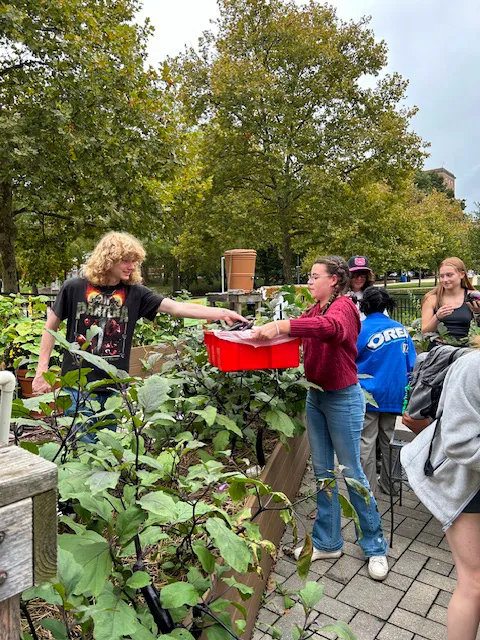- October 03, 2024
- By Karen Shih ’09
Amid shelves of beige pasta and grains and bags of black and brown beans, a colorful array of purple Japanese eggplants, sun-ripened cherry tomatoes and crisp green cucumbers beckoned visitors to the University of Maryland Campus Pantry early this fall.
For the nearly one in four students who experience food insecurity at UMD, the ability to pick up farm-fresh, locally grown veggies in addition to shelf-stable staples is thanks in part to College of Agriculture and Natural Resources Principal Lecturer Meredith Epstein and campus partners in Dining Services, the UMD Arboretum and Botanical Garden, and the Counseling Center. Since the summer, they’ve harvested more than 20,000 pounds of produce from Terp Farm and the Community Learning Garden for UMD’s pantry—open to anyone with a UMD ID but primarily for students—and other hunger relief organizations.

“It’s so important and impactful that this food is being grown by
students for students,” said Epstein, who manages the Community Learning Garden on campus as part of her teaching duties at the Institute of Applied Agriculture.
Her project was one of 27 funded by the Do Good Campus Fund in its inaugural year—an example of the ways that UMD faculty, staff and students work to serve humanity and reimagine learning.
“I have been just blown away by my experience so far,” said Epstein, who used the funds to hire six student interns to help plant and harvest, as well as spread awareness of campus food insecurity work through research, videos and presentations. “The fund is letting us take our program to the next level, so we can tell the story of what we do and why it matters."
Now, applications are open for the second year, available to those looking to expand or scale up efforts across UMD. Students, faculty and staff can apply for grants, and at least $320,000 will be awarded for projects starting in summer or fall 2025, to be used within one year.
Check out how several of last year’s projects are improving the UMD community and beyond.
Creating Culturally Competent Autism Support Services
Having
a child with autism can be stressful for any family. But for immigrants
trying to navigate the American health care and community support
systems, the situation can be overwhelming.
This summer, an expanded program from the College of Education helped bridge that gap for Asian American families in Montgomery County, Md., providing not only an opportunity for children to practice important independent living, gross motor and social skills, but a welcoming gathering space for parents who felt isolated due to cultural stigmas about developmental disabilities.
“There are so many barriers that Asian and other culturally diverse families face,” said special education Assistant Professor Veronica Kang. “There’s a lack of accessibility and resources to support them.”
Working with the Chinese Culture and Community Service Center, Kang hosted 20 families for four-hour sessions throughout the summer, serving kids ages 3 to 15. UMD undergraduate and graduate students, as well as a few from other local universities, worked one-on-one and in small groups with the autistic youth, incorporating Asian cultural activities and materials into their music, literacy, game and snack sessions.
“It’s important to be mindful about making our special education and related disciplines workforce more diverse,” said Kang, to serve a broad population. “It’s a really great learning and training experience for future researchers and clinicians.”
Closing the Engineering Opportunity Gap
Five
hundred and fifty Prince George’s County ninth graders got a jump-start
on possible paths to engineering through the GOAL Challenge program
hosted at Ritchie Coliseum in July. A Do Good Campus Fund grant expanded
the offerings with more racecart-building kits, curriculum development
and marketing materials.
Created by A. James Clark School of Engineering’s Women in Engineering (WIE) Program, the Environmentally and Socially Responsible Engineering team and the Department of Mechanical Engineering in summer 2020, the program aims to close opportunity gaps for K-12 students, especially those from historically underrepresented racial and ethnic groups, first-generation students, and women and girls.
“It is vital to improve diversity and inclusion in engineering so that all perspectives are represented in the solutions” to wide-ranging societal challenges, said WIE Director Paige Smith.
GOAL also offers UMD undergraduates an opportunity to get creative and use their skills to help develop new iterations of the kit and work with community and educational partners on high-quality engineering activities.
Uplifting Harriet Tubman’s Legacy
For a dozen
College Park Scholars, a three-day trip this fall will give them not
only a chance to immerse themselves in the world of famed abolitionist
Harriet Tubman, but also help bring that story to a wider audience.
“Just an hour and a half from campus are some of the most inspirational stories in American history,” said journalism lecturer Alison Burns, who leads the Media, Self and Society program. “It’s a legacy students should know about and experience, walking the areas where she was running to freedom.”
The Do Good Campus Fund grant has given Burns the opportunity to revamp the Scholars program’s curriculum, increasing experiential and service learning. To prepare for the trip to Cambridge, Md., in late October, where students will learn from and work with the Harriet Tubman Freedom Center, students have started a book club, reading “Harriet Tubman: The Road to Freedom” by Catherine Clinton. The funding also allows Burns to bring in Scholars alum Lauren Hamilton ’22, now a podcast producer for WAMU, to teach the students about interviewing and audio storytelling. What they produce will help promote the center’s work as it uncovers more of Tubman’s legacy.
“This is a great opportunity to expose our media Scholars students to media literacy for social impact,” said Burns.
Do Good Campus Fund
Application Deadline: Nov. 4
Awarded Funds Available: July 1, 2025
Grant Sizes: $5,000 for student groups; up to $35,000 for staff and faculty
